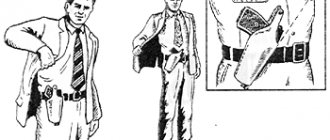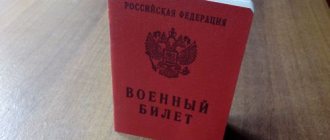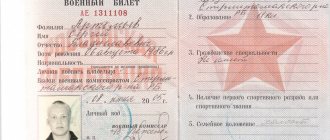What exactly does Article 14b mean on a military ID? A lot of citizens of military age cannot answer this question accurately, even despite the fact that it was for this reason that they were commissioned. Meanwhile, its presence in the future brings many problems. Surely those who suffer the most are those who, during the process of passing the draft board, did everything possible to avoid joining the army at any cost.
What exactly is the problem? Everything is very simple - the article in question indicates the presence of mental disorders. It is not difficult to guess that such a diagnosis imposes many restrictions both in everyday life and when choosing a job.
What category of suitability corresponds to the articles
Taking into account the letter attached to the serial number of the article, doctors determine the fitness category:
- point a, “D” - absolutely unsuitable for conscription into the armed forces;
- point b, “C” – limited validity;
- point c, “D” – the conscript is unfit, then only temporarily;
- point d, “B-4” is valid, but there are some minor restrictions.
The selected notation for the explanation of the article is composed in accordance with a simple pattern. Having studied the document, many things fall into place; the conscript will understand what was written on his military ID.
Part 2 art. 14 of the Criminal Code of the Russian Federation
An action (inaction), although formally containing signs of any act provided for by this Code, but due to its insignificance, does not pose a public danger, is not a crime.
Article 13 of the Criminal Code of the Russian Federation Extradition of persons who have committed a crime
Article 15 of the Criminal Code of the Russian Federation Categories of crimes
Table of contents
Is it possible to change or remove an article?
It is impossible to completely remove an article from a document. We are talking about the most severe and even mild diagnoses. Milder pathologies that can be eliminated after long-term treatment, which indicates the possible removal of the diagnosis itself. However, such a procedure takes a very long time. The man needs to confirm at the next medical examination, which is possible once every five years, that the disease no longer exists. To do this, you need to write a corresponding application for a repeat medical examination.
The application is submitted to the regional or city PND, to the chief physician. The date of the meeting of the medical commission will be announced a little later, where you will need to appear for re-examination. Most often, the applicant is placed in a hospital department, where observation takes place for a period of two weeks to a month. The man does not receive any medicine. Medical diagnostics, various types of testing, and routine observation are performed, after which specialists draw conclusions about the possible removal of the diagnosis. However, even in the case of a positive decision, the article itself will remain written down in the military document.
Many cunning people have nevertheless learned to remove an article from a military ID, although not entirely legally. All you need to do is allegedly lose your ticket, write an application for reinstatement, and the new document will no longer contain any articles.
Psychiatrist → consultations
If we are not talking about technical personnel.
- Naturally, if in the future a man expresses a desire to go to serve, this will be impossible.
- Go to study at a higher institution, get a good specialty.
- In fact, if such a stamp is received by a person who does not pretend to have such a dangerous and serious disease, then he is unlikely to need something like that.
However, when a guy once refused to serve and managed to get away with it, then with such a stigma, the problem will certainly become significant. There is no guarantee that a man will not change his mind after a couple of years to salute his homeland, and removing such a mark will be problematic, as well as clearing himself of such characteristics. Is it possible to change or remove an article According to experts, it is simply impossible to remove an article with such a disease from a military ID.
Is it possible to get rid of restrictions on this article?
This question interests readers even more than the meaning of the article itself. Unfortunately, there is no single algorithm here, since such a procedure is not provided for by law. Initially, it was understood that such a diagnosis, which is positioned under points “a” or “b”, is incurable, and therefore there is no need to develop standards for re-examination.
But it’s not only draft dodgers who are asking questions about how to remove Article 14b. Due to the doctor’s incompetence, a recording may appear that will ruin the whole fate of the young man. Searching for the truth in this case is practically useless, so it is better to start taking specific actions.
First of all, it is necessary to remove the diagnosis. Even if you are sent to the military registration and enlistment office to first remove the article, know that the medical workers are playing it safe because they do not want to take responsibility, which is quite reasonable. For example, you were allowed to drive buses, and suddenly an aggravation occurred. First of all, the charges will fall on the doctor who canceled the diagnosis, and the military registration and enlistment office is not obliged to deal with this issue.
Returning to the legal aspects, we will highlight several areas for further action, depending on the situation.
- At the military registration and enlistment office you were diagnosed with 14b, although a full examination was not carried out in the hospital and you expected to receive a deferment for another illness. This means that the doctor is incompetent or exceeding his authority. Until 3 months have passed since the diagnosis was made, feel free to file a lawsuit. Moreover, obtain a written refusal to change the entry on the military ID.
- You found the article, but more than 3 months have passed. Alas, you can count on re-examination only 5 years after diagnosis. It is necessary to submit an application to the chief physician in order to conduct an examination, as a result of which you will have the diagnosis removed. Then, with this data, you must go to the military registration and enlistment office and demand that the article be removed.
Possible obstacles can arise at almost every stage. It all depends on the human factor. For example, some readers claim that a simple conversation was enough to obtain a certificate from a psychiatrist. As a result, the person received a license, despite the fact that there was an article on his military ID.
But since you cannot count on such an outcome, get ready for possible litigation. If the PND refuses to conduct a re-examination, you will have to seek this right through the court. The court will be on your side only if you convince it that the deadline for filing the application was delayed for a good reason.
Author's rating Author of the article Oksana Filatova Physician. Current member of the VVK. 88 articles written
Commentary on Article 14 of the Criminal Code of the Russian Federation
The commented article provides a definition of a crime, which is understood as a socially dangerous act committed guilty of guilt, prohibited by the Criminal Code of the Russian Federation under threat of punishment. The definition of the concept of a crime belongs to the category of formal-material ones, since in it the legislator indicates both a material sign - social danger, and formal signs - the illegality and punishability of the act.
Thus, the law establishes four criteria, the presence of which an act is recognized as a crime: guilt, public danger, illegality and punishability.
When defining a crime, the law uses the collective concept of “act”. It means both an external act of human behavior (action, inaction) and a crime in general.
Crime, like any other human behavior, is expressed in two aspects: internal and external. The internal side of behavior consists of its awareness by the subject and will, i.e. the ability to selectively respond to external factors, strive to achieve a specific goal, and overcome external and internal obstacles. In criminal law, the expression of will is determined by such concepts as “desire”, “conscious assumption”, “indifference”.
A criminal act, being a variety of human actions, must first of all have all the signs of the latter in a psychological sense. In psychology, behavior is a socially significant system of human actions; individual behavioral actions are called an act if they correspond to generally accepted norms of behavior, and an offense if they do not correspond to these norms.
Psychologically, every human action or inaction is motivated, i.e. caused by certain motives or their system (self-interest, jealousy, etc.), and purposefulness, anticipation of the results of one’s behavior. Motivation and purposefulness of behavior ensure the person’s freedom of will, i.e. freedom to choose between at least two behavior options. In criminal behavior, a person chooses between antisocial and lawful, at least non-criminal, behavior.
Thoughts, mental processes, beliefs, and their external expression, despite their possible negative nature, are not crimes.
The presence of guilt is a necessary sign of a crime. This means that only behavior that includes its internal aspect: consciousness and will can be considered criminal. A person is not subject to criminal liability if he was not aware of the actual nature and social danger of his actions or inactions or if he could not control them due to the reasons specified in the law.
It is in this regard that the criminal law includes a number of provisions, according to which the criminality of an act is excluded if it is not caused by consciousness or will.
Thus, a state of insanity excludes the presence of a crime. Unconscious reflex movements (reflex reactions) are not a crime. A person cannot be held criminally liable in cases where he acts under the influence of physical or mental coercion, and while maintaining the ability to act in such a situation, the issue is resolved taking into account the provisions of the institution of extreme necessity. Excludes the criminality of the act and the presence of force majeure, etc.
The inclusion of such a property as guilt in the signs of a crime means the implementation in Russian criminal law of the principle of subjective rather than objective imputation. Subjective imputation presupposes the presence of a certain mental attitude of a person to the socially dangerous act he has committed (action, inaction) and the socially dangerous consequences. This relationship may consist of intent or negligence (Articles 24 - 27 of the Criminal Code of the Russian Federation). The priority of the principle of subjective imputation is enshrined, in our opinion, in Part 1 of Art. 28 of the Criminal Code of the Russian Federation, which established that an act is recognized as committed innocently if the person who committed it did not realize and, due to the circumstances of the case, could not have realized the social danger of his actions (inaction) or did not foresee the possibility of socially dangerous consequences and, due to the circumstances of the case, should not have or could not have foreseen them.
For the presence of a socially dangerous act, the external manifestation of a person’s behavior is no less important, i.e. those body movements that cause or can cause changes in the outside world. A person’s body movements, although mechanical, manifest his will and can reflect a person’s mood, his emotions, the movement of thought (words, gestures, facial expressions). The physiological side of human behavior can be expressed by action or inaction.
Action is an active form of human behavior. Most often it consists of performing a set of certain movements, but it can also be performed in one movement. In criminal law, action consists of the external manifestation of those acts that are prohibited by criminal law. Moreover, the set of body movements when committing a crime of the same type can be very different. Thus, murder can be committed by firing a shot from a weapon, or it can be committed by adding poison (poisoning). In the criminal legal aspect, the initial and final moments of the action depend on the design of the crime and the legislative definition of its objective side. Thus, the initial moment of the action may be a set of body movements aimed at creating conditions for committing a crime, for example, finding accomplices for committing a particularly serious crime, or it may be the direct execution of the objective side, for example, a blow with a fist to the temporal part of the head. Similarly, the moments at which an action is completed vary. In case of one-moment crimes, for example, insult, the moment of the beginning of the action and its completion coincide, and in case of multi-moment crimes, the moment of completion of the action is associated with the execution of the entire set of movements. For example, the commission of fraud may begin with deception, and the moment of its completion is associated with the moment of taking possession of property and causing damage.
Inaction is a passive form of behavior. It consists of failure to perform those actions that a person should and could have performed, and abstaining from performing them. At the same time, inaction does not mean that a person is completely passive during the commission of a crime and does not perform any actions. It may be active, but at the same time not perform exactly those actions that, due to certain circumstances (for example, a requirement of the law or the creation by the guilty of conditions of danger for any interests), it was obliged to perform and could perform the required actions. For example, the culprit, who is obliged to ensure compliance with the requirements of safety regulations for work, does not fence off the dangerous area, which leads to serious harm to human health. In this case, they did not comply with the requirement of the rules to install a fence, although it should and could have been fulfilled. In the absence of an objective possibility of performing the required actions, criminal omission will not take place. Thus, a doctor’s failure to provide assistance to a patient due to the inability to arrive to him on time as a result of a flood does not constitute a criminal inaction, since the failure to fulfill a medical duty was in this situation due not to the will of the subject, but to force majeure.
Criminal inaction can be expressed in a one-time failure to perform mandatory and objectively necessary actions, or it can also consist of systematic passive behavior.
To recognize an act as a crime, it must have the attribute of a public danger. If the act does not pose such a danger, there are no grounds for classifying it as criminal. This is due to the fact that, as noted above, the definition of the concept of a crime is formal and material, and therefore the sign of public danger is a mandatory and integral feature of the crime.
Social danger is a material sign of a crime that reveals its social essence. Public danger can be defined as the ability of an act to cause harm or create a threat of harm to objects protected by law. Public danger is inherent in any offense, but among them the crime is distinguished by the nature and increased degree of social danger and harmfulness of the act. The absence of a social danger of an act or the low degree of its social danger means the absence of a crime. That is why in Part 2 of Art. 14 of the Criminal Code of the Russian Federation establishes a provision according to which an action (inaction) is not a crime, although formally it contains signs of any act provided for by the Criminal Code of the Russian Federation, but due to its insignificance does not pose a public danger.
Speaking about insignificance, it should be noted that neither theory nor practice have developed sufficiently clear criteria for its definition. In each specific case, the issue of insignificance is resolved independently. However, his decision is based on both objective and subjective factors. Only their totality makes it possible to establish the degree of social danger of the act. In this case, the dominant role is given to subjective factors, since it is the direction of intent, and not just the actual harm caused, that largely indicates the degree of social danger of the act.
Social danger is characterized by objective and subjective characteristics.
Objective signs should include the significance, importance for society and the state of the object of the attack, the degree of implementation of the criminal intent, the method of committing the crime, the amount of harm or the severity of the consequences, the conditions of the time and place of the crime (state of emergency, natural or other public disaster).
Subjective signs are the form of guilt, the presence of antisocial motives and goals (for example, committing a crime motivated by political, ideological, racial, national or religious hatred or enmity, or motivated by hatred or enmity towards any social group, committing a crime out of revenge for legitimate actions of other persons, as well as in order to hide another crime or facilitate its commission, etc.).
The social danger of an act is an objective property. With the development and changes occurring in society, the degree of social danger of a particular act may decrease, increase, disappear, or arise. Thus, in connection with the growing threat of terrorism, the degree of public danger of its manifestations increases, which is objectively reflected in the sanctions of Art. 205 “Terrorist act” of the Criminal Code of the Russian Federation. The degree of public danger of theft has fluctuated in recent years, which leads to a change in the relationship between the concepts of “petty theft” (Article 7.27 of the Code of Administrative Offenses of the Russian Federation and Note 1 to Article 158 of the Criminal Code of the Russian Federation). The development of society and the state has led, in the opinion of the legislator, to the loss of the degree of public danger necessary for a crime for such an act as deception of consumers (Article 200 of the Criminal Code of the Russian Federation), and acts causing damage to the interests of service in commercial and other organizations were criminalized due to increased the degree of their public danger. The introduction by law of criminal liability for a particular act is evidence that it has reached such a level of public danger that the restoration of broken social relations requires the use of state forces and means, and vice versa, and the adoption of a law eliminating or mitigating criminal liability is an act in accordance with with which the nature and degree of social danger of certain crimes are redefined.
Formally, the degree of public danger of crimes is reflected in the legislator’s classification of them into a certain category of crimes: from a crime of minor gravity to a particularly serious crime. But such an assessment is not a manifestation of voluntarism, since a wise legislator, identifying socially dangerous acts and determining the degree of their harmfulness, “does not make laws, he does not invent them, but only formulates them” <1>.
——————————— <1> Marx K., Engels F. Op. 2nd ed. T. 1. P. 162.
Criminal wrongfulness means the prohibition of a certain act by the norm of the Criminal Code of the Russian Federation under the threat of punishment. Wrongfulness is the formal establishment in criminal law of a socially dangerous act that is recognized as a crime. Russian criminal law, when defining the concept of “crime,” is based on the principle NULLum crimen sine leges (there is no crime unless it is specified in the law). Therefore, the Special Part of the Criminal Code of the Russian Federation indicates all acts that are currently classified as crimes. Outside of these acts there are no crimes. There is no crime beyond those signs of specific crimes described in the Special Part of the Criminal Code of the Russian Federation. This approach to the illegality of a crime also follows from the provisions of the principle of legality (Part 1 of Article 3 of the Criminal Code of the Russian Federation), which consists in the fact that the criminality of an act, as well as its punishability and other criminal legal consequences are determined only by the Criminal Code of the Russian Federation, i.e. by law.
In this regard, we can say that illegality is the legal consolidation of the material property of a crime - social danger and is correlated with the latter as form and content.
In Art. 14 of the Criminal Code of the Russian Federation is the first time that the punishability of an act is named as a sign of a crime. Punishability of a crime means that the legislator establishes for each act provided for by the Criminal Code of the Russian Federation a punishment of a certain type, term or amount. However, this provision does not mean that every person who commits a crime must be subject to criminal punishment. The criminal law knows a significant number of institutions that allow the offender to be released from criminal liability or punishment.
All four considered signs of a crime are interconnected and obligatory. Only their complete set allows us to speak of a socially dangerous act as a crime, which seems extremely important in terms of protecting the rights and freedoms of man and citizen, excluding the possibility of preventive condemnation, conviction without guilt and other unjustified expansion of criminal repression.
Article 14b in the military ID
Entries in documents that are intended to obtain all information about a person must be made clearly and accurately, with one hundred percent accuracy. One of such certificates is a military ID. Since this document is always required to be presented at important life moments, it becomes clear that the data recorded in it is of great importance.
This applies to the military section, where the presence of a diagnosis is recorded in the event of unfitness discovered by the doctors of the draft commission. The disease, which is registered as Article 14b in the military ID, subsequently becomes a reason for a citizen’s refusal to obtain a profession related to government activities, transport and carrying weapons. What is encrypted in this recording?
Article 14 b how to obtain rights
admin Articles Contents:
- Is it possible to remove Article 14b from a military ID? Answers from lawyers (2) Looking for an answer?
It’s easier to ask a lawyer! Medical examination for a driver’s license if Article 23 of Federal Law-53 is indicated on the military ID. Answers from lawyers (1) Looking for an answer?
It’s easier to ask a lawyer! Article on a military ID, can I get a driver’s license? Answers from lawyers (1) Looking for an answer? It’s easier to ask a lawyer! Is it possible to get a license with a personality disorder? Is it possible to get a license with a personality disorder? Is it possible to get a license with a diagnosis of psychopathy? Is it possible to get a license with Article 14b?
Article 18b - is it possible to get a license? How is Article 14b deciphered in a military ID card? The meaning of Article 14 according to the Schedule of Diseases. Is it possible to get rid of restrictions on this article? 2 comments What do Articles 14 (a, b, c, d) mean in a military ID card? What do Articles 14a, 14b, 14c mean? and 14g in a military ID How are 14 articles deciphered What category of fitness corresponds to the articles What consequences may there be in the future Is it possible to change or remove the article Interpretation of Article 14 in the previous edition Is it possible to remove Article 14b in a military ID? Hello .
How to remove a mark in a military record
Since the legislation does not have a single algorithm for how to cancel an encoding record, we can only give the standard steps that need to be taken when initiating the cancellation of a diagnosis. The lack of a simplified way to change an entry is due to the fact that such diseases, especially those related to subsections “a” and “b”, are incurable. Therefore, there is no need to develop rules for their cancellation. But there is also a medical error, so there cannot be an unequivocal refusal to re-examine.
Until 2005, point 14 could be removed from a military officer only once every 3 years based on the results of re-examination at a medical institution. But only diseases whose letter designation was up to category “B” were considered, and if the candidate was under 27 years of age. Currently, by special order of the Government, this rule has been abolished. This is explained by the fact that persons sent to the reserves do not serve in military service in peacetime conditions, and therefore are of no interest to the state.
Notation 14b on a military ID is a complete basis for deferment or exemption from the army, but in turn is not an obstacle to undergoing a new medical examination to remove the diagnosis and eliminate the article from the document.
For reference! A repeated medical examination initiated by a man for the purpose of removing subparagraph 14b cannot be considered a signal to the military registration and enlistment office to immediately redirect him to an additional medical commission for conscription. But it is legal to invite someone to undergo a recommission when an opportunity arises, for example, during a new conscription.
There are several options for removing the encrypted disease encryption. Their implementation depends on the situation and factors that accompanied the assignment of the diagnosis.
Situation 1. The final code was issued at the military registration and enlistment office, although a full examination was not carried out in the hospital. The conscript expected to receive a deferment due to another illness. There is evidence of incompetence of the doctor who conducted the examination or abuse of authority. In this case, it is important not to waste time, since the record can be canceled through the court, but no later than three months from the date of diagnosis. The record will be changed only if there is a court decision forcing these actions.
Situation 2. The mark on the military serviceman was discovered later, after three months had passed. In this case, you can count on a recommission only after 5 years. But if you initiate a re-examination at a medical institution on your own initiative, then you can obtain a final act confirming the absence of the disease, which allows you to classify the citizen as sent to the reserve under Article 14b. The document must be sent to the military registration and enlistment office and demand that the code be removed.
Obstacles from doctors and military registration and enlistment office workers can arise at every stage. It all depends on the human factor. The guy also needs to realize that he will have to serve the required time in the Armed Forces. But there will be no entry 14b in the military record
Let's analyze the algorithm of action of a young man who wanted to remove an article, step by step:
- A handwritten application is drawn up addressed to the head of the medical institution at the place of residence. The document indicates a request to undergo a second re-examination.
- Additional certificates in the form of characteristics from the place of residence and work (study) are prepared for the application.
- The man goes through the doctors who are announced to the commission for examination.
- Based on the results of the commission, he receives medical confirmation that the previously established diagnosis has not been confirmed and has been removed.
- He visits the military registration and enlistment office, where he also writes a statement addressed to the military commissar with a request to cancel the military registration mark. Additionally, a medical examination report is attached.
As a rule, the procedure is lengthy to implement, but it guarantees removal of the diagnosis, which helps to lift restrictions in the man’s future life.
Required documents
The documentation package depends on the type of foreign citizen and the nature of the reason for using the expedited procedure.
Let's consider the possible outcome of events:
| Article 14 paragraph | documentation | |
| 1a (for children, if the parent is a citizen of the Russian Federation) | Residence permit with a registration stamp at the place of residence; certificate of income, certificate of pension amount; a document stating that the applicant speaks Russian; birth certificate with a notarized translation; application for renunciation of previous citizenship (if there is no international agreement between countries on the possibility of dual citizenship); copy of parent's passport; certificates of divorce (conclusion), indicating a change of name with a notarized translation; state duty in the amount of 3,500 rubles; application for citizenship with reasons. | |
| 1b (for former citizens of the Soviet Socialist Republics) | residence permit; 4 photos; income certificate; a document confirming the renunciation of recent citizenship, including a receipt for payment of a written application to the consulate of another country; receipt, notarized translations of all identification documents. A birth certificate that was actually issued on the territory of the former RSFSR, USSR. | A birth certificate is recognized as a document issued in 1974. |
| 2b (marriage with a Russian citizen) | marriage certificate; Russian passport of the spouse; receipt of payment of state duty; residence permit; statement, photographs | Copies of documents are provided only with originals. |
| 2c (disabled foreigner whose children are citizens of the Russian Federation) | residence permit; income certificates; statement; birth certificate; disability certificate, pension certificate, certificates from medical experts indicating the poor state of health of the parent. | The age of a disabled citizen must be 65 years for a man and 60 years for a woman. |
| 2g (in the absence of a custodial parent) | Documents that can confirm the presence of Russian citizenship of the absent parent | |
| 2e | National passport; a notarized copy of the diploma and all attachments to it; certificate of state accreditation of a particular university; a certificate from the employer about paid contributions to the pension fund. |
An alternative way to remove an article
There is another option for getting rid of the encryption in the ID. It consists in using Government Resolution No. 217. This standard, in force since 2020, indicates the incompetence of entering a code into a military ID. According to the new law, only the fitness group is assigned to a military officer. Based on the standard, a person has the right to replace his existing military ID. The new document will not contain the title of the article.
In this case, there is no need to undergo a complete medical examination. It is enough to submit a written application to the commissariat.
In addition to the application form, you must provide additional personal information, which includes the following:
- date of receipt and serial number of the certificate;
- address of the military registration and enlistment office that issued the previous document;
- what disease code is written down, with its full decoding.
Replacing an old ticket with a new one is easy. This is explained by the fact that it contains violations of legal acts that must be corrected. If difficulties arise in implementing this method, then you need to contact the courts. By a court decision, the document can be exchanged without hindrance.
The presence of a code is fraught with sudden surprises that can accompany a man throughout his life, while limiting his rights everywhere.
A man may have Article 14 indicated on his military ID. Not everyone knows what it means. This addition is indicated if a mental disorder is discovered during a medical examination in a conscript. Because of this, he is not allowed to serve. Often young people try to pass themselves off as mentally ill in order to get exemption from the army. But such games often turn into major troubles for them in civilian life.
What does Article 14 mean?
The person to whom Article 14 was assigned must know its decoding. Thanks to this, he will be able to understand how to act in order to avoid negative consequences due to this instruction in the military ID.
Each conscript has the right to ask a specialist about the designation of his article in the military ID. Therefore, you should not be afraid to ask your doctor such questions.
The transcript of Article 14 is as follows. First of all, attention is paid to the disease number. After this, a letter is examined, which indicates the stage of progression of the pathological process.
Article 14, which is present on the military ID, regardless of the letter next to it, indicates that the conscript has a mental disorder. This is a superficial transcript of the postscript. These violations are organic in nature.
Article 14 indicates mental disorders that manifest themselves in the form of changes in behavior. The main signs of the disease are caused by brain injuries, infectious and other pathologies that disrupt the functioning of this organ. Given these features of the development of the disease, it is difficult for a doctor to diagnose it without a detailed examination of the patient. If mental disorders falling under Article 14 are suspected, the conscript is sent for examination to a hospital.
14a, 14b, 14c and 14d
A person diagnosed with a mental disorder is unfit for military service
A competent specialist, seeing the number and letter of the article on the military ID, immediately understands exactly what diagnosis was given to the young man. The conscript himself can decipher the postscript if he is familiar with the following features of its assignment:
- 14a. The article is indicated in the military ID of conscripts who have obvious and persistent mental disorders. They have a distinct character. Such conditions cannot be called characteristic of a healthy person. Pathology may affect his intellectual abilities. Psychoorganic personality changes cannot be ruled out.
- 14b. This article is assigned to men who have moderate mental health problems. They may experience psychotic symptoms, which have a favorable course. Individuals with this diagnosis experience asthenic, affective, personality and cognitive disorders.
- 14th century An article with such differences warns of the presence in a person of painful manifestations of a mild mental disorder. As a rule, their appearance is caused by brain injuries that provoke temporary disturbances.
- 14 The entry in the military ID indicates the presence of persistent compensation for pathological disorders that can be obtained as a result of head injury or inflammation of the brain. In this case, the central nervous system is not affected by the disease, so its functions are preserved.
In the process of studying the transcript of the article that is placed on the conscript’s military ID, the whole essence of the problem becomes clear. A certain pattern can be traced in the assignment of numbers to letter order. The further a letter is in the alphabet, the less pronounced mental disorder is observed in a person.
14B and driver's license
12/07/2017 Is the doctor acting legally? What to do. Will this help?? The article provides for psychosis, other mental disorders, changes in personality and behavior caused by damage and dysfunction of the brain (trauma, brain tumors, encephalitis, meningitis, neurosyphilis, as well as senile and presenile psychoses, vascular, degenerative, other organic diseases and brain lesions). Examination of citizens is carried out after an inpatient (outpatient) examination. a) with pronounced persistent mental disorders; b) with moderately severe mental disorders; c) with mild short-term painful manifestations; d) with persistent compensation of painful disorders after an acute brain disease or closed craniocerebral injury; Article 14 b provides for psychoses, other mental disorders, changes in personality and behavior,
Suitability category
A person who has Article 14D on his military ID will never receive the right to drive a car.
Article 14 provides for a certain category of fitness. It is usually determined by its serial number and letter value. This postscript may have the following category:
- A. A person assigned to this category may be called up for military service. There are no restrictions placed on him when choosing the type of troops;
- A1. There are certain restrictions, such as denying a man suitability to serve in the elite forces. This can be caused by previous illnesses that are not dangerous after recovery;
- A2. Indicates a number of limitations that are caused by severe injuries;
- B. A conscript can enlist even though he has been diagnosed with minor health problems;
- Q. A young man may be called up to serve in the army if there is martial law in the country. In peacetime, he is assigned to the reserve group, which is called up secondarily in the event of an enemy attack;
- D. The conscript is considered unfit for service. He receives a deferment until his health indicators improve significantly. He will need to undergo an annual medical examination to confirm or change the diagnosis;
- D. Indicates the conscript’s complete unsuitability for military service. People with this category are not conscripted even in wartime. They are given a “white ticket”.
The last category “D” is considered the most terrible for a conscript. Often young people try to get it moderately in order to avoid being drafted into the army. But you need to understand that it causes significant problems in civilian life. A man with Article 14 of category “D” will not be able to get a job in a responsible position. Driving vehicles is also prohibited for him.
Possible consequences
They will never join the special forces under Article 14
Article 14b, which is present in the military ID, causes a lot of problems.
Any article on a military ID is considered problematic. Such a registration deprives a person of the opportunity to get a good job. With Article 14, a man will definitely not be hired to serve in the Ministry of Emergency Situations, the Ministry of Internal Affairs, the Federal Penitentiary Service, the FSB and other organizations of this type.
Failure to get the desired job and military service are the main consequences of Article 14.
The secret meaning and symbolism of the number 1441
There are many secret meanings that we can associate with the number 1441. This number is very specific, so we will try to explain its symbolism to you in detail.
The secret message your angels are sending you through angel number 1441 has something to do with working with the light and serving others. Your angels remind you that you should help other people just as the angels help you.
When you help someone, you feel good and proud of yourself. By helping others, you benefit not only them, but also yourself.
This is why your guardian angels tell you that you should take every opportunity you have to help other people and be kind to them.
They will appreciate it and your angels will reward you for all the good you do.
When it comes to people with angel number 1441, we must tell you that these people are very determined and have a strong character. You can always rely on such a person, so it is always good to have him as a friend.
We should also mention that people with angel number 1441 can sometimes be mysterious and have opposite personalities.
In fact, it may happen that the number 1441 may be kind at one moment, but at another moment this number can become abusive and fiery. Because of this, you should be careful with anyone who has angel number 1441. Another important characteristic of people who have angel number 1441 as their angel is that they love to be the leader in every situation.
They have a strong character and never give up on their goals. They are ready to fight and rise above all the problems they have. Nothing can bring them down because they are the ones full of self-confidence and completely dedicated to their goals.
We can also say that a person with angel number 1441 is fearless and independent.
Is it possible to get a driving license?
Article 14 in a military ID leads to certain restrictions that in one way or another affect a man’s life. In this regard, questions often arise about whether it is possible to obtain a driving license with such a registration. To give an accurate answer to them, it is necessary to take into account a lot of nuances. The most important among them is the current state of health of the person.
According to statistics, men with minor mental disorders that make them under Article 14 are successful in obtaining a driver's license in 90% of cases.
Young people who have severe forms of mental pathologies, for which Article 14 of various categories are awarded, should not count on obtaining a driver’s license. In this state, a person’s behavior is unstable, so driving is prohibited for him.
A psychiatrist is considering the possibility of a man with Article 14 obtaining a driving license. All people who plan to obtain a driver's license must undergo examination by him, since this is a mandatory procedure for potential drivers.
A psychiatrist conducts a full diagnosis of a person with suspected mental disorder. He must personally verify the presence of the disease, and not refer solely to the mark that the patient has on his military ID. After this, the specialist makes a decision on whether the man can drive or not.
A psychiatrist has the right to deny a young person the opportunity to obtain a driving license if he has the following deviations:
- Lack of empathy;
- Increased cruelty;
- Falsehood;
- Tendency to harm others.
These symptoms indicate a serious illness that makes a man mentally ill and unbalanced. In this state, he is strictly forbidden to drive a car.
Conditions of application - pre-emptive rights
Dear readers! The article talks about typical ways to resolve legal issues, but each case is individual. If you want to find out how to solve your particular problem , contact a consultant:
8 (800) 700 95 53
APPLICATIONS AND CALLS ARE ACCEPTED 24/7 and 7 days a week.
It's fast and FREE !
The Russian Migration Division is carefully studying the list of foreign nationals who want to settle in the Russian Federation permanently. However, some categories have preferential rights.
Among them:
- Citizens who previously lived in the territory of the former USSR, RSFSR.
- Foreigners, capable citizens of other countries who have disabled parents or grandparents in Russia.
- A parent of Russian children, if the other parent is declared missing or deceased.
At birth
Anyone who was born on the territory of the USSR can safely be recognized as a newly made citizen of Russia. An important caveat: on the birth certificate of such people there is o. It is this case that is described in Section 2 of Article 14 of the Federal Law “On Citizenship” under paragraph a.
Upon marriage
Marital union with a Russian citizen is welcome. Saving the marriage is important. For an accelerated procedure, you must be “in a registered relationship” for three years (clause 2b).
If you have a child with Russian citizenship
As you know, a child born on the territory of the Russian Federation from foreigners or in a mixed couple will be recognized as Russian by birth. He has the right to live anywhere in the world. But it happens that he remains in the care of one of his parents in Russia.
Life often makes its own adjustments to human destinies. It happens that a custodial parent in some situation cannot, for some reason, continue to raise children.
Examples of force majeure events:
- The father (mother) has been deprived of parental rights.
- The father (mother) received restrictions on parental rights.
- The custodial parent has become incapacitated.
- The parent has disappeared and is declared missing.
- The parent died (died).
Under these circumstances, the search process for the second parent is initiated.
Even though he does not have Russian citizenship and lives outside the territory of the Russian state, from now on he has the right to live next to the child as a Russian citizen. Local executive bodies will help him with this.
For adult children
Adult Russian citizens may be declared legally incompetent due to disability. Their treatment, maintenance and care require the close attention of their parents, who, unlike the latter, remain legally competent persons.
If they arrive from other states, wanting to help children who find themselves in difficult life situations, then they immediately receive Russian passports upon presentation of the appropriate documents (point 2e).
Point E
Article 14 of the Federal Law on Citizenship concerns many people arriving from different states. Paragraph e specifically describes the mechanisms for obtaining Russian documents for students.
Such people with higher education can contribute to the accelerated development of the economy and an increase in performance in many industries. Therefore, the authorities are interested in ensuring that qualified personnel remain in Russia.
So, foreigners who received their diploma after July 1, 2002 can safely count on government support.
To do this you need:
- Complete successful training in the main programs taught in Russian universities.
- Study only in educational institutions that have state accreditation. Study in graduate school, master's degree, or strive to obtain a scientific degree.
- Work in scientific organizations in the Russian Federation.
- Work successfully after graduation.
For these categories, it is important to apply for citizenship in a timely manner. The period begins to be calculated from the time of receipt of SNILS.
After all, any employer is obliged, when employing a foreigner, to transfer part of the funds from wages to the Pension Fund.
Attention! An important condition of paragraph e of Article 14 is the payment of insurance contributions to the Pension Fund of the Russian Federation within a three-year period.
See how to obtain Polish citizenship. Full responsibility of foreign citizens and stateless persons. Find it at the link.










